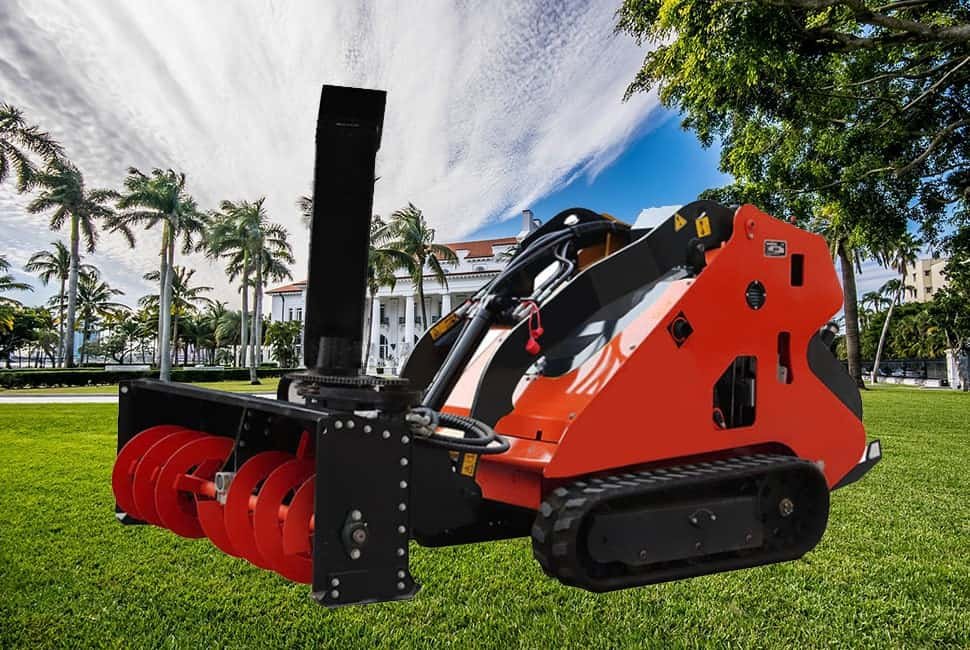Choosing the right equipment for your project can significantly impact efficiency and costs. When deciding between a mini excavator and a backhoe, understanding their differences is key. This guide will help you compare these two machines to make an informed decision based on your specific needs.
A mini excavator and a backhoe are both versatile construction machines, but they have distinct differences. The mini excavator is ideal for compact spaces and precise digging, while a backhoe offers greater digging depth and lifting power. This article explores key differences, including versatility, cost, and performance to guide your purchasing decision.
Let’s dive into a detailed comparison of mini excavator vs backhoe, including their key differences, versatility, costs, and more.
What is a Mini Excavator and a Backhoe?
In the dynamic world of construction, two machines stand out for their utility and efficiency: the mini excavator and the backhoe. Both are staples in the industry, yet they cater to different needs and boast unique designs. Delving into their fundamental characteristics is crucial for selecting the appropriate machinery for your specific project.
Mini Excavators:
Mini excavators are the compact workhorses of the construction site. Equipped with a boom, arm, and bucket, these machines are specifically engineered for digging and material handling in cramped spaces. Their diminutive stature, with operating weights between 1 to 6 tons, allows them to navigate and operate in areas that are inaccessible to larger equipment. This makes mini excavators the go-to choice for a variety of tasks in urban construction, landscaping, and residential projects where space is at a premium.
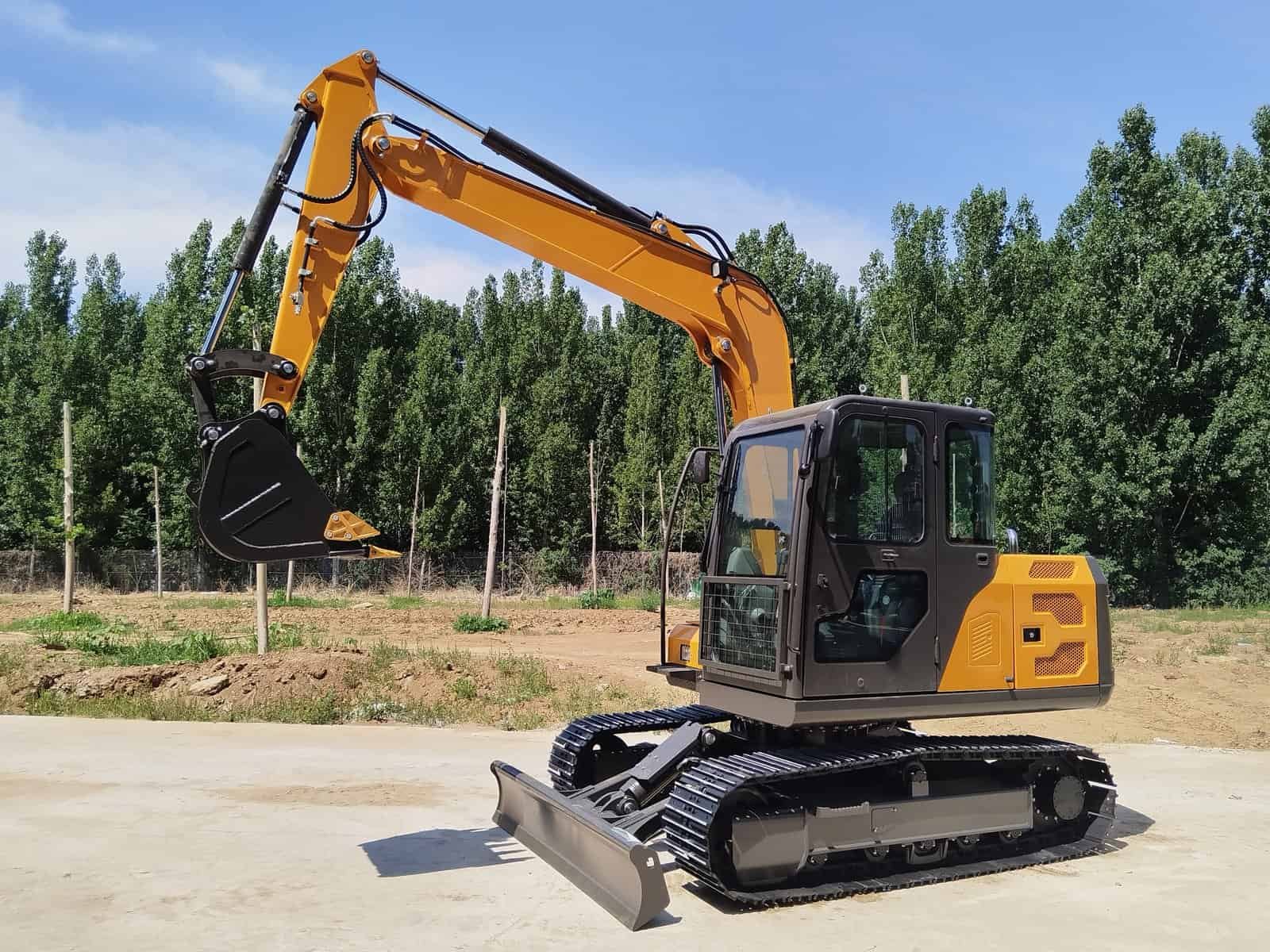
Backhoes:
Backhoes, in contrast, are the Swiss Army knives of the construction industry. They combine the functionality of a front loader with a rear digging arm, offering a wide range of capabilities. These machines are adept at digging, lifting, and hauling, making them suitable for a diverse array of tasks. The front loader is perfect for scooping and moving materials, while the rear arm excels at digging trenches, foundations, and other excavation tasks. Backhoes are generally larger and more versatile, making them ideal for general construction, roadwork, and larger-scale projects where heavy-duty performance is required.
Understanding the differences between mini excavators and backhoes is key to ensuring that you choose the right machine for your project. By considering the specific requirements of your task, you can select the machinery that will maximize efficiency and productivity on the job site.
Mini Excavator vs Backhoe: Key Differences
When it comes to choosing between a mini excavator and a backhoe, understanding their key differences in functionality, maneuverability, and ideal applications is crucial. These distinctions can significantly impact your decision-making process and help you select the machine that best suits your specific needs.
Mini Excavators:
Mini excavators are renowned for their exceptional maneuverability in tight and confined spaces. Their compact design enables them to navigate and operate in areas where larger machinery simply cannot fit. This makes them ideal for urban construction projects, landscaping tasks, and residential work, where space is often limited and obstacles such as buildings or fences are common. Their ability to turn in tight circles and move easily around obstacles ensures smooth and efficient operations, even in the most restricted environments.
Backhoes:
Backhoes, on the other hand, shine in tasks that demand both digging and lifting capabilities, particularly in larger, open areas. Equipped with a front loader and a rear digging arm, backhoes can dig deeper and lift heavier loads than mini excavators. This versatility makes them the preferred choice for a wide range of construction tasks, including road construction, trenching, and heavy excavation projects. Their robust design and powerful performance are well-suited for handling the demands of larger-scale projects, where heavy-duty work is required.
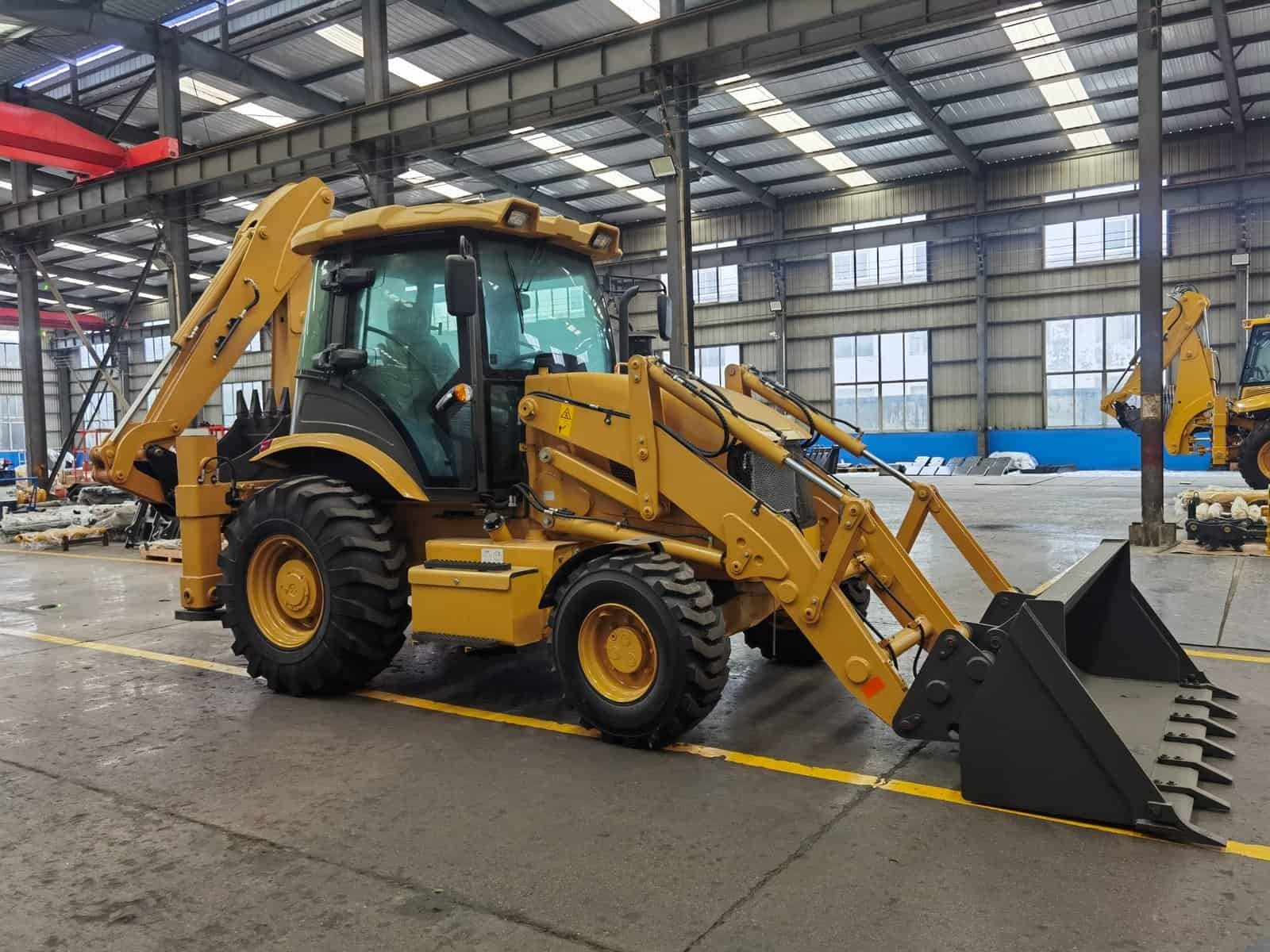
The choice between a mini excavator and a backhoe depends largely on the specific requirements of your project. If you need a machine that can maneuver easily in tight spaces and handle smaller-scale tasks, a mini excavator is likely the better option. However, if your project involves heavy lifting and deep excavation in larger areas, a backhoe would be the more suitable choice. By carefully considering these factors, you can make an informed decision that will optimize the efficiency and productivity of your construction work.
Which is More Versatile: Mini Excavator or Backhoe?
When it comes to selecting the right machine for your construction project, versatility is a crucial factor to consider. Both mini excavators and backhoes offer unique capabilities, but understanding which one is more versatile for your specific needs can save you valuable time and money.
Mini Excavators:
Mini excavators are highly versatile machines, particularly in tight or hard-to-reach areas. Their compact size makes them ideal for urban environments, landscaping projects, and any task that requires precision and agility in confined spaces. The ability to fit through narrow passages and work around obstacles without causing damage is a significant advantage.
Mini Excavator Attachments:
One of the key strengths of mini excavators is their adaptability through a variety of attachments. These machines can be fitted with augers for drilling holes, hydraulic hammers for demolition tasks, and grapple buckets for material handling. This versatility allows mini excavators to tackle specialized tasks such as drilling in narrow spaces or performing demolition work in tight areas, making them a valuable asset for a wide range of projects.
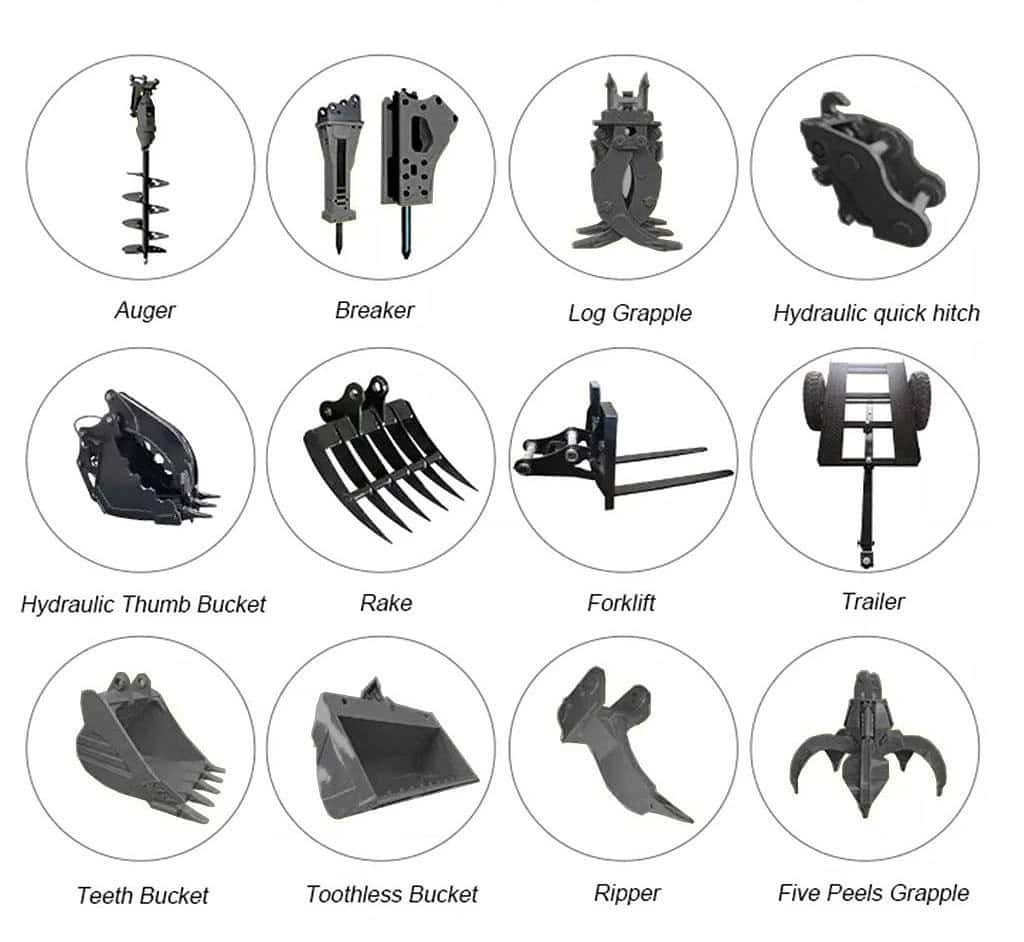
Backhoes:
Backhoes are renowned for their versatility in handling a broad spectrum of construction tasks. Equipped with a front loader and a rear digging arm, backhoes can perform both lifting and digging operations with ease. Their larger size and greater lifting capacity make them suitable for more intensive tasks, such as lifting heavy materials and digging deep trenches.
Backhoe Attachments:
Backhoes can also be fitted with a variety of attachments to enhance their functionality. These attachments include buckets for material handling, breakers for breaking up hard surfaces, and augers for drilling. The combination of their size and lifting capacity allows backhoes to handle more demanding tasks, making them a versatile choice for general construction, roadwork, and large-scale excavation projects.
Both mini excavators and backhoes offer significant versatility, but their strengths lie in different areas. Mini excavators excel in tight spaces and specialized tasks, while backhoes are more suited for a broader range of construction tasks, especially those requiring heavy lifting and deep excavation. By understanding the unique capabilities of each machine, you can make an informed decision that will optimize the efficiency and effectiveness of your construction project.
Cost Comparison: Mini Excavator vs Backhoe
When deciding which equipment to purchase, cost is a critical consideration. To help you make an informed decision, let’s delve into the prices and operating costs of mini excavators and backhoes, so you can determine which offers the best value for your specific project.
Mini Excavators:
Mini excavators generally come with a lower upfront cost compared to backhoes. Their compact size and specialized design make them more affordable initially. However, it’s important to note that their operating costs, such as maintenance and fuel consumption, can vary significantly based on usage patterns and the specific tasks they are employed for.
Backhoes:
Backhoes, being larger and more powerful, typically have a higher initial purchase price. Their greater size and versatility come with a higher price tag, but they also offer enhanced lifting and digging capabilities, which can be a worthwhile investment for projects that require heavy-duty operations.

Upfront Costs:
The purchase price of a mini excavator usually ranges from $30,000 to $70,000, depending on the model and brand. This makes them an attractive option for those looking to minimize initial expenditure. In contrast, a backhoe can cost anywhere from $50,000 to $120,000. The higher price reflects the additional features and capabilities that backhoes offer, making them a more substantial investment.
Operational Costs:
While mini excavators generally have lower fuel consumption, backhoes are often more fuel-efficient when it comes to tasks that require significant lifting and heavy digging, particularly in large-scale projects. This means that, over time, the fuel costs for a backhoe may be more manageable for certain types of work. Additionally, maintenance costs for backhoes can be higher due to their larger size and more complex components. Regular maintenance is essential to keep these machines running efficiently, which can add to the overall operating costs.
While mini excavators offer a lower initial purchase price and can be more cost-effective for specific tasks, backhoes provide greater versatility and capabilities, albeit at a higher upfront and operational cost. By carefully considering your project’s specific needs and the long-term costs associated with each machine, you can make a well-informed decision that aligns with your budget and project requirements.
Which One is Better for Your Project?
Choosing between a mini excavator and a backhoe ultimately hinges on the specific requirements of your project, including the type of work, site size, and budget. To help you make the right decision, let’s explore how to select the machine that best fits your needs.
Mini Excavator for Small Projects:
Mini excavators are the go-to choice for smaller projects that require precision and maneuverability in tight spaces. Their compact size makes them ideal for residential projects, landscaping tasks, and urban construction sites where space is at a premium. Whether you’re digging foundations, working around existing infrastructure, or performing delicate excavation work, mini excavators offer the agility and control needed to get the job done efficiently. Their ability to navigate narrow passages and work in close proximity to buildings or other obstacles without causing damage is a significant advantage.

Backhoe for Large Projects:
Backhoes, on the other hand, are designed for larger-scale projects that demand heavy lifting, deep digging, and efficient material handling. They are particularly well-suited for construction projects, roadwork, and agricultural tasks where versatility and power are crucial. Equipped with powerful hydraulics and larger buckets, backhoes can handle demanding tasks more efficiently, making them the preferred choice for projects that require significant excavation and material movement. Their robust design and advanced capabilities allow them to tackle a wide range of tasks, from digging deep trenches to lifting heavy materials, ensuring that your project progresses smoothly and efficiently.
The decision between a mini excavator and a backhoe should be based on the specific demands of your project. If you need a machine that can operate in tight spaces and perform precise tasks, a mini excavator is the ideal choice. However, if your project involves heavy lifting, deep digging, and a variety of construction tasks, a backhoe will provide the power and versatility you need. By carefully considering these factors, you can select the machine that will optimize the efficiency and success of your project.
Pros and Cons of Mini Excavator and Backhoe
Both mini excavators and backhoes come with their own set of advantages and disadvantages. Understanding these can help you make a balanced decision based on the specific needs of your project.
Mini Excavators:
Mini excavators excel in tight spaces and precise work but are limited in lifting capacity. Their compact size and ability to maneuver in confined spaces make them ideal for urban environments and tight project areas. They also have lower operating costs in some cases.
1. Pros of Mini Excavators:
- Compact and Maneuverable: Their small size allows them to navigate and operate in tight spaces, making them perfect for urban construction sites or areas with limited space.
- Precision: Mini excavators are designed for precision work, such as digging foundations or working around existing infrastructure, ensuring accuracy and minimizing damage.
- Lower Operating Costs: In some cases, mini excavators have lower fuel consumption and maintenance costs compared to larger machines, making them more cost-effective for smaller projects.
2. Cons of Mini Excavators:
- Limited Lifting Capacity: Their smaller size means they have a lower lifting capacity and digging depth, making them unsuitable for larger, more complex tasks that require heavy lifting.
- Less Versatile: While they are excellent for specific tasks, mini excavators are not as versatile for lifting and hauling heavy materials, limiting their use in certain types of projects.
Backhoes:
Backhoes offer more power and versatility but may be too large for compact work areas. They are equipped with greater lifting capacity, deeper digging capabilities, and are versatile for a variety of tasks, from digging to lifting to transporting.
1. Pros of Backhoes:
- Greater Lifting Capacity: Backhoes can handle heavier loads and deeper digging, making them ideal for larger construction projects, roadwork, and heavy excavation tasks.
- Versatilidad: Their front loader and rear digging arm allow them to perform a wide range of tasks, including lifting, digging, and transporting materials, making them a versatile choice for diverse projects.
- Robust Design: Backhoes are built to handle demanding tasks and heavy-duty operations, ensuring durability and reliability in challenging environments.
2. Cons of Backhoes:
- Size and Maneuverability: Their larger size makes them less maneuverable in tight spaces, making them less suitable for small residential projects or areas with limited space.
- Higher Operating Costs: Backhoes generally have higher fuel consumption and maintenance costs due to their larger size and more complex components, which can add to the overall operating expenses.
The choice between a mini excavator and a backhoe should be based on the specific requirements of your project. If you need a machine that can operate in tight spaces and perform precise tasks, a mini excavator is the ideal choice. However, if your project involves heavy lifting, deep digging, and a variety of construction tasks, a backhoe will provide the power and versatility you need. By carefully considering these factors, you can make an informed decision that aligns with your project’s needs and budget.
When to Choose a Mini Excavator Over a Backhoe?
Choosing a mini excavator over a backhoe can be the right decision when your project demands precision, flexibility, and the ability to work within space constraints. Here are some scenarios where opting for a mini excavator makes the most sense.
Mini Excavators: The Ideal Choice for Precision and Flexibility
Mini excavators are perfectly suited for urban construction, landscaping, and any project that requires maneuverability in tight spaces. Their compact design and precise control make them ideal for tasks that demand accuracy and agility, such as digging foundations, trenches, and working around existing structures.
Construcción Urbana:
In the bustling environment of cities or residential areas where space is at a premium, mini excavators shine. Their ability to navigate narrow streets, alleys, and confined construction sites allows them to provide efficient and precise results. Whether you’re digging foundations for new buildings, creating trenches for utility installations, or performing landscaping work, mini excavators can get the job done without causing disruption to the surrounding area.
Landscaping and Renovations:
For small-scale landscaping projects, mini excavators are a game-changer. They excel in tasks that require precise digging, such as planting trees, installing irrigation systems, or creating trenches for drainage. Their compact size allows them to work in close proximity to existing plants, structures, and other landscaping features without causing damage. This makes them an invaluable tool for both residential and commercial landscaping projects, ensuring that your outdoor spaces are transformed with precision and care.
Other Ideal Applications:
Mini excavators are also well-suited for a variety of other tasks, including:
- Residential Projects: From backyard renovations to small-scale construction, mini excavators can handle tasks that larger machines cannot. They can dig footings for patios, install septic systems, or remove tree stumps with ease.
- Infrastructure Maintenance: In urban areas, mini excavators can be used for maintaining and repairing underground utilities, such as water pipes and electrical lines, without causing significant disruption to traffic or pedestrians.
- Tight Spaces: Any project that involves working in tight spaces, such as basements, narrow alleys, or between closely spaced buildings, is a perfect fit for mini excavators. Their ability to turn in tight circles and operate in confined areas makes them indispensable in these situations.
Mini excavators are the ideal choice for projects that require precision, flexibility, and the ability to work within tight spaces. Whether you’re involved in urban construction, landscaping, or any other project that demands careful handling and maneuverability, a mini excavator can provide the efficiency and control you need to get the job done right. By understanding the unique capabilities of mini excavators, you can make an informed decision that will optimize the success of your project.
When to Choose a Backhoe Over a Mini Excavator?
When faced with larger, more demanding construction tasks, a backhoe often emerges as the superior choice. Here are some key scenarios where opting for a backhoe over a mini excavator makes the most sense.
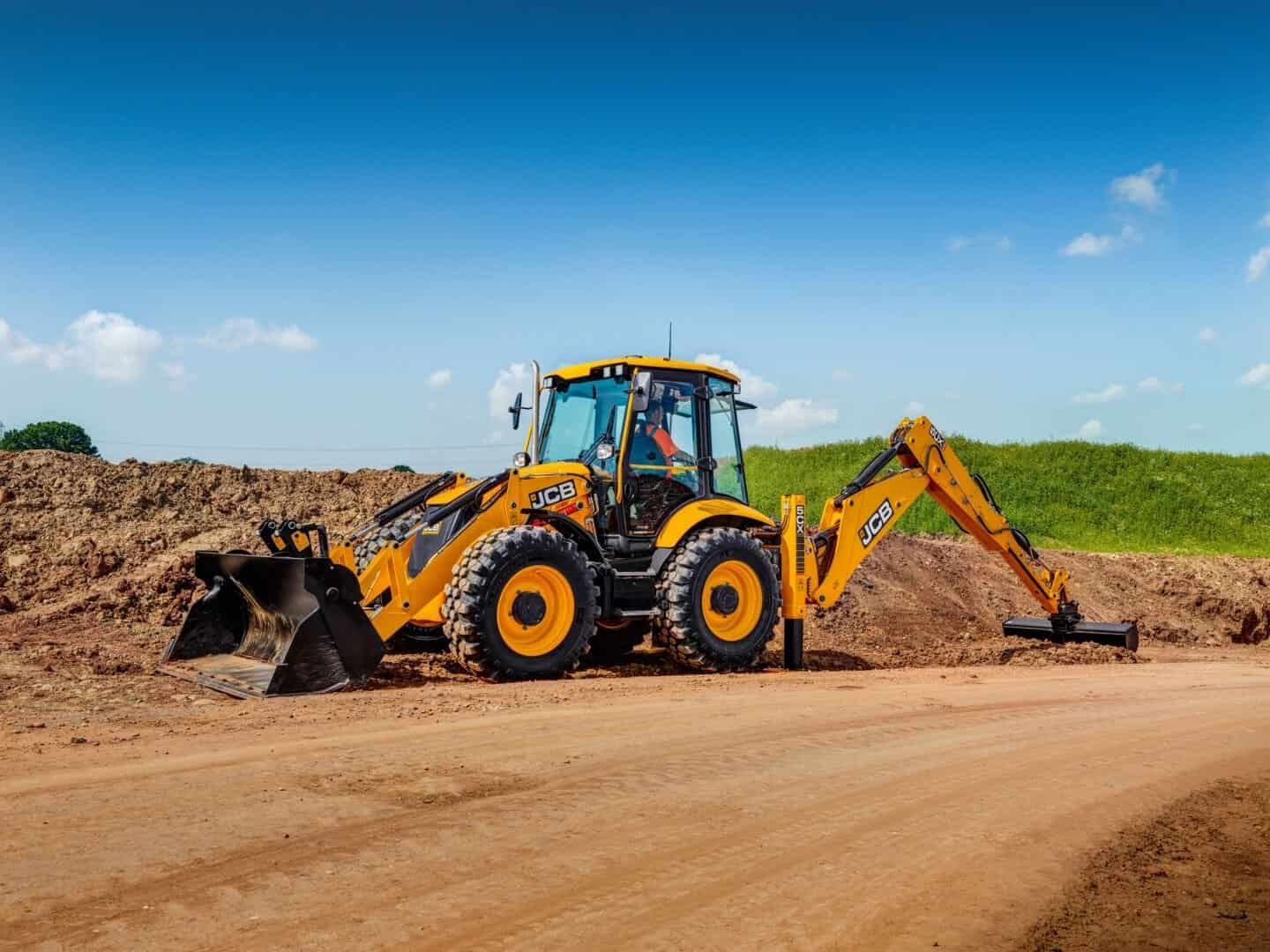
Backhoes: The Powerhouse for Heavy-Duty Tasks
Backhoes are designed to tackle heavy-duty tasks with ease, making them ideal for roadwork, large excavation projects, and agricultural work that requires lifting, digging, and hauling large volumes of material. Their robust design and versatile functionality set them apart as the go-to machine for a variety of demanding tasks.
Grandes Proyectos de Construcción:
If your project involves moving large amounts of dirt, digging deep trenches, or lifting heavy loads, a backhoe’s superior power and versatility make it the clear choice. Backhoes are equipped with powerful hydraulics and larger buckets, allowing them to handle demanding tasks more efficiently. Whether you’re working on a large-scale construction site, building roads, or excavating for foundations, a backhoe can provide the heavy-duty performance you need to get the job done quickly and effectively.
Agricultural and Industrial Use:
Backhoes are also commonly used in agricultural and industrial projects for a wide range of tasks. In agriculture, they can be used to dig irrigation channels, level soil on large properties, and perform other tasks that require significant power and precision. Their versatility makes them an invaluable tool for farmers and landowners looking to manage large plots of land efficiently. In industrial settings, backhoes can handle tasks such as site preparation, material handling, and excavation for infrastructure projects.
Other Ideal Applications:
Backhoes are not limited to construction and agriculture; they are also well-suited for:
- Utility Installation: Backhoes can efficiently dig trenches for utility lines, ensuring that electrical, water, and gas lines are installed quickly and accurately.
- Limpieza de tierras: For large-scale land clearing projects, backhoes can remove trees, stumps, and other obstacles with ease, preparing the land for development or agricultural use.
- Demolition Work: Backhoes equipped with specialized attachments can perform demolition tasks, breaking down structures and removing debris efficiently.
Backhoes are the ideal choice for projects that require heavy-duty performance, versatility, and the ability to handle large volumes of material. Whether you’re involved in large construction projects, agricultural work, or any other task that demands significant power and functionality, a backhoe can provide the efficiency and reliability you need to succeed. By understanding the unique capabilities of backhoes, you can make an informed decision that will optimize the success of your project.
Resumen:
Both mini excavators and backhoes have unique advantages. Mini excavators excel in tight spaces and precision tasks, while backhoes are better for heavy-duty work requiring lifting and digging. Choose based on your project’s size, scope, and specific requirements.

